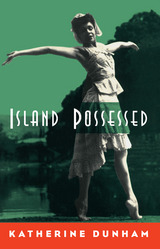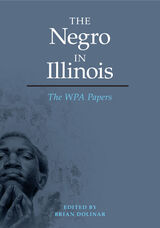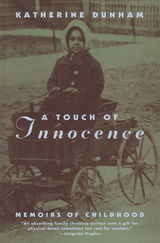3 books by Dunham, Katherine

Island Possessed
Katherine Dunham
University of Chicago Press, 1994
Just as surely as Haiti is "possessed" by the gods and spirits of vaudun (voodoo), the island "possessed" Katherine Dunham when she first went there in 1936 to study dance and ritual. In this book, Dunham reveals how her anthropological research, her work in dance, and her fascination for the people and cults of Haiti worked their spell, catapulting her into experiences that she was often lucky to survive. Here Dunham tells how the island came to be possessed by the demons of voodoo and other cults imported from various parts of Africa, as well as by the deep class divisions, particularly between blacks and mulattos, and the political hatred still very much in evidence today. Full of the flare and suspense of immersion in a strange and enchanting culture, Island Possessed is also a pioneering work in the anthropology of dance and a fascinating document on Haitian politics and voodoo.
[more]

The Negro in Illinois
The WPA Papers
Edited by Brian Dolinar
University of Illinois Press, 2013
A major document of African American participation in the struggles of the Depression, The Negro in Illinois was produced by a special division of the Illinois Writers' Project, one of President Roosevelt's Works Progress Administration programs. The Federal Writers' Project helped to sustain "New Negro" artists during the 1930s and gave them a newfound social consciousness that is reflected in their writing.
Headed by Harlem Renaissance poet Arna Bontemps and white proletarian writer Jack Conroy, The Negro in Illinois employed major black writers living in Chicago during the 1930s, including Richard Wright, Margaret Walker, Katherine Dunham, Fenton Johnson, Frank Yerby, and Richard Durham. The authors chronicled the African American experience in Illinois from the beginnings of slavery to Lincoln's emancipation and the Great Migration, with individual chapters discussing various aspects of public and domestic life, recreation, politics, religion, literature, and performing arts. After the project was canceled in 1942, most of the writings went unpublished for more than half a century--until now.
Working closely with archivist Michael Flug to select and organize the book, editor Brian Dolinar compiled The Negro in Illinois from papers at the Vivian G. Harsh Collection of Afro-American History and Literature at the Carter G. Woodson Library in Chicago. Dolinar provides an informative introduction and epilogue which explain the origins of the project and place it in the context of the Black Chicago Renaissance. Making available an invaluable perspective on African American life, this volume represents a publication of immense historical and literary importance.
[more]

A Touch of Innocence
A Memoir of Childhood
Katherine Dunham
University of Chicago Press, 1994
An internationally known dancer, choreographer, and gifted anthropologist, Katherine Dunham was born to a black American tailor and a well-to-do French Canadian woman twenty years his senior. This book is Dunham's story of the chaos and conflict that entered her childhood after her mother's early death.
In stark prose, she tells of growing up in both black and white households and of the divisions of race and class in Chicago that become the harsh realities of her young life. A riveting narrative of one girl's struggle to transcend the painful confusions of a family and culture in turmoil, Dunham's story is full of the clarity, candor, and intelligence that lifted her above her troubled beginnings.
"A Touch of Innocence is an absorbing family chronicle written with a gift for physical detail sometimes too real for comfort. In quietly graphic prose the growing girl, the slightly older brother, the ambitious father and the kind stepmother are pictured in such human terms that when their lives get tied into harder and harder knots beyond their undoing, one can only continue to read helplessly as doom closes in upon the household."—Langston Hughes, New York Herald Tribune
"A Touch of Innocence is one of the most extraordinary life stories I have ever read . . . . The content of this book is so heartbreaking that only the strongest artistic skills can keep it from leaking out into sobbing self-pity, but Katherine Dunham's art contains it, understands it and refuses to be overwhelmed by its terrors."—Elizabeth Janeway, New York Times
"The first eighteen years of the famous dancer and choreographer's life are brought vividly to the reader in this first volume of her autobiography. She writes of what it is like to be a special, gifted young woman growing up in a racially mixed family in the American Middle West. A beautiful, touching and sometimes discomforting book."—Publishers Weekly
"As writing it is honest, searing, graphic and touching, giving us a rather heartbreaking early view of the young American Negro who was later to make a name for herself as a dancer and choreographer."—Arthur Todd, Saturday Review
In stark prose, she tells of growing up in both black and white households and of the divisions of race and class in Chicago that become the harsh realities of her young life. A riveting narrative of one girl's struggle to transcend the painful confusions of a family and culture in turmoil, Dunham's story is full of the clarity, candor, and intelligence that lifted her above her troubled beginnings.
"A Touch of Innocence is an absorbing family chronicle written with a gift for physical detail sometimes too real for comfort. In quietly graphic prose the growing girl, the slightly older brother, the ambitious father and the kind stepmother are pictured in such human terms that when their lives get tied into harder and harder knots beyond their undoing, one can only continue to read helplessly as doom closes in upon the household."—Langston Hughes, New York Herald Tribune
"A Touch of Innocence is one of the most extraordinary life stories I have ever read . . . . The content of this book is so heartbreaking that only the strongest artistic skills can keep it from leaking out into sobbing self-pity, but Katherine Dunham's art contains it, understands it and refuses to be overwhelmed by its terrors."—Elizabeth Janeway, New York Times
"The first eighteen years of the famous dancer and choreographer's life are brought vividly to the reader in this first volume of her autobiography. She writes of what it is like to be a special, gifted young woman growing up in a racially mixed family in the American Middle West. A beautiful, touching and sometimes discomforting book."—Publishers Weekly
"As writing it is honest, searing, graphic and touching, giving us a rather heartbreaking early view of the young American Negro who was later to make a name for herself as a dancer and choreographer."—Arthur Todd, Saturday Review
[more]
READERS
Browse our collection.
PUBLISHERS
See BiblioVault's publisher services.
STUDENT SERVICES
Files for college accessibility offices.
UChicago Accessibility Resources
home | accessibility | search | about | contact us
BiblioVault ® 2001 - 2024
The University of Chicago Press









